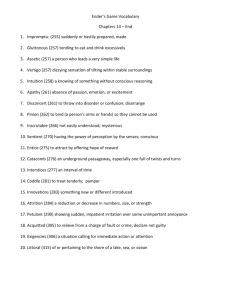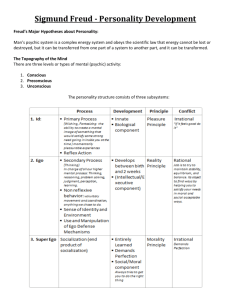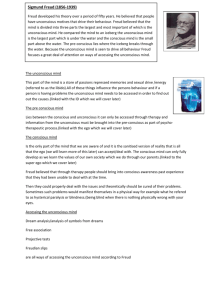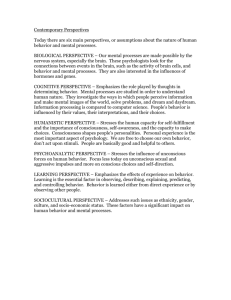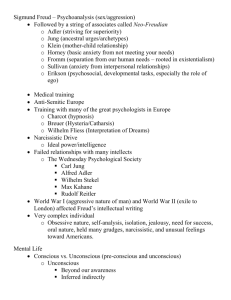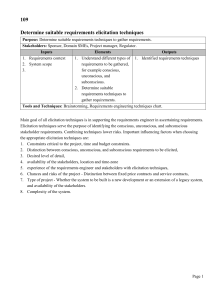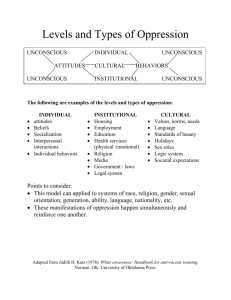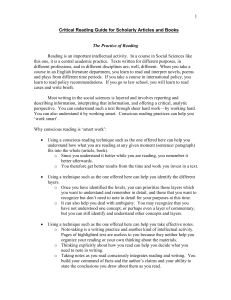conscious leadership
advertisement
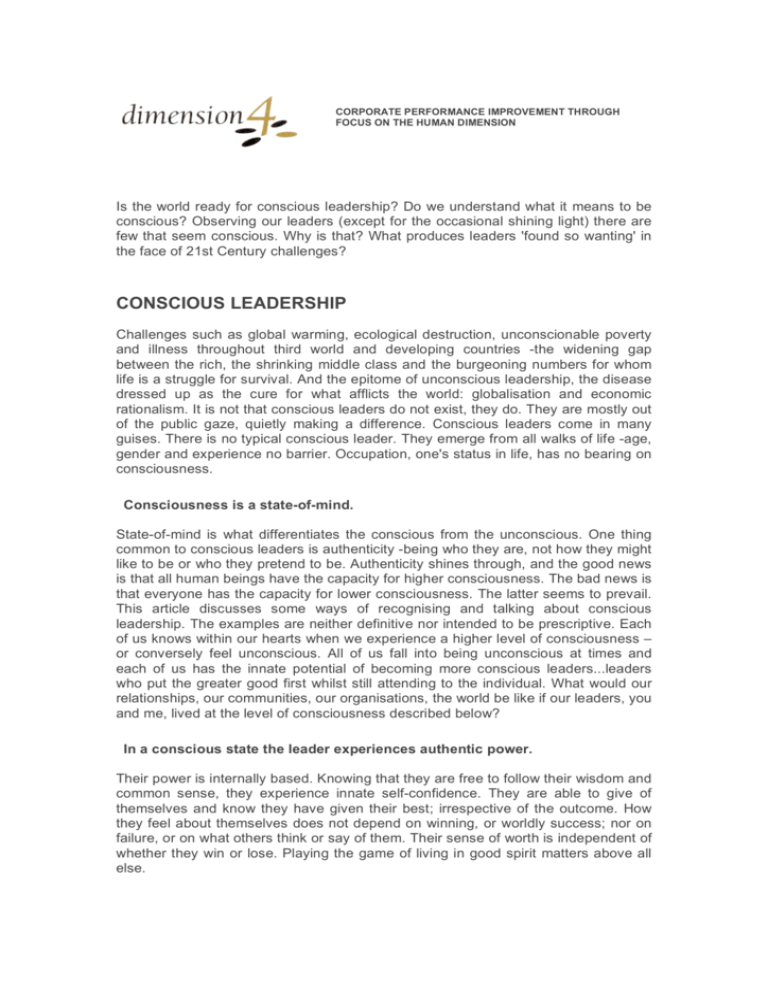
CORPORATE PERFORMANCE IMPROVEMENT THROUGH FOCUS ON THE HUMAN DIMENSION Is the world ready for conscious leadership? Do we understand what it means to be conscious? Observing our leaders (except for the occasional shining light) there are few that seem conscious. Why is that? What produces leaders 'found so wanting' in the face of 21st Century challenges? CONSCIOUS LEADERSHIP Challenges such as global warming, ecological destruction, unconscionable poverty and illness throughout third world and developing countries -the widening gap between the rich, the shrinking middle class and the burgeoning numbers for whom life is a struggle for survival. And the epitome of unconscious leadership, the disease dressed up as the cure for what afflicts the world: globalisation and economic rationalism. It is not that conscious leaders do not exist, they do. They are mostly out of the public gaze, quietly making a difference. Conscious leaders come in many guises. There is no typical conscious leader. They emerge from all walks of life -age, gender and experience no barrier. Occupation, one's status in life, has no bearing on consciousness. Consciousness is a state-of-mind. State-of-mind is what differentiates the conscious from the unconscious. One thing common to conscious leaders is authenticity -being who they are, not how they might like to be or who they pretend to be. Authenticity shines through, and the good news is that all human beings have the capacity for higher consciousness. The bad news is that everyone has the capacity for lower consciousness. The latter seems to prevail. This article discusses some ways of recognising and talking about conscious leadership. The examples are neither definitive nor intended to be prescriptive. Each of us knows within our hearts when we experience a higher level of consciousness – or conversely feel unconscious. All of us fall into being unconscious at times and each of us has the innate potential of becoming more conscious leaders...leaders who put the greater good first whilst still attending to the individual. What would our relationships, our communities, our organisations, the world be like if our leaders, you and me, lived at the level of consciousness described below? In a conscious state the leader experiences authentic power. Their power is internally based. Knowing that they are free to follow their wisdom and common sense, they experience innate self-confidence. They are able to give of themselves and know they have given their best; irrespective of the outcome. How they feel about themselves does not depend on winning, or worldly success; nor on failure, or on what others think or say of them. Their sense of worth is independent of whether they win or lose. Playing the game of living in good spirit matters above all else. In an unconscious state the leader's sense of power is externally based. They see it based on structure, position, rank, affiliations and the imagined trappings of power. He or she is constantly worried about what others think of them; say about them, and of how others behave towards them. Their life is a frightening political game. They are forever keeping score. Winning matters above all else. Conscious leaders are fearless. They understand the generic source of fear and with that understanding their life is not ruled by fearful thinking even when they feel frightened. They see fear as living in the past -from a particular ideology, religion or similarly rigid view of life. Conscious leaders have a freedom that enables them to see beyond their own beliefs, opinions, judgements and values -to experience a grander & nobler vision of life. They see what is! They see beyond the imperatives that we all make up to feel safe. Unconscious leaders are the most frightened of the fearful. Their fear drives them to seek the illusion of power. They come from left, right, centre and all points in between, ruled by the blindness of their ideology, dogma and favourite 'ism'. Their view must prevail or 'we will all fail', 'my/our work will be destroyed', in one way or another. Unconscious leaders think in absolutes and are absolutely sure that we will fail politically, economically, environmentally, socially or spiritually if we do not follow the 'right' course. Alternatively, they may have no ideology at all but simply live from the conditioned belief that their survival is always under threat -and seek security in power and influence. The result is the same. A low level of consciousness is an absence of creation, newness, freshness -manifest in positive action and clarity. In seeing what is. In a conscious state leaders are extraordinary listeners. They are curious about and listen deeply to, life. They know that the clues and cues for leading come from listening to life. They listen from an unhurried mind no matter how busy or demanding their lives may be. The conscious leader listens from an open heart, especially to those telling him or her things that fly in the face of what they think to be true, or even want to hear. They encourage those who have a different reality to express their views, fully and frankly. They are not threatened by difference. They see the nature of separate realities -and are comfortable with them. Understand the vital nature of diversity. As a consequence they continue to learn from every twist and turn as life unfolds. 2 In an unconscious state the leader, at best, pretends to listen. Hearing words but not touched by them, the unconscious leader is a pretender - with no idea of who they or others really are at their core, the authentic being behind the personality. They are threatened by difference. Their world is defined by job, friends, the car they drive, the house or suburb they live in, education, religion, ideology...self-image. This false self is who they believe they are (shaky ground on which to stand, the rumble of fear loud). As a consequence they discover little from life, simply accumulating evidence to support existing beliefs and values. Conscious leaders are in integrity with their wisdom and common sense. In this state they are connected to their inner world, their deeper intelligence. They listen only to this inner authority -the source of wisdom within each of us. They effortlessly hold firm in the face of difficulty, even as others around them lose their bearings. Short-term solutions and short-term gains are not tempting. The conscious leader sees with clarity the difference between substance and style...what is worthwhile and what is worthless. In an unconscious state leaders vacillate, give in to pressure, have no sense of the difference between substance and style, what is true; what is false. Expedience, personal power, self-preservation or blind commitment to the 'party line' drives their leadership style. The desire for sustaining their authority or blind subservience to an external authority overshadows their capacity to see what is -and the automatic action that results when we see what is with clarity. Conscious leaders are vanguards. Champions for the advancement of their colleagues, their community...for the whole of humanity. They are courageous yet humble in sponsoring what they see will assist their fellows; whether it be family, friends, neighbours, the man in the street or someone completely unknown in another land. In an unconscious state leaders promote their own greater glory or some external authority -done so with blind arrogance. They are disconnected from their more noble feelings by beliefs, prejudices and values. Unconscious leaders are about 'being right and making others wrong'. They are self-absorbed and consequently self-centred. What advances the greater good is not in focus, not within the realm of their thinking. What advances their personal glory, success, safety and power is paramount. Keeping ahead of the game is what matters. 3 Conscious leaders are not blind followers. They don't 'toe the party line'. When they see the party line is 'out of integrity' with the best interests of the greater good they stand to be counted. Their inner wisdom and common sense guides them. At the same time they support others who display conscious leadership, wholeheartedly. Conscious leaders discourage followers and discourage dependency. Rather, they point others toward their own innate wisdom and common sense, that deeper intelligence innate to all human kind. In an unconscious state leaders live by second-guessing. They lead from opinion polls but fail to understand what the opinion polls are pointing toward. They do not ask 'what are people really trying to express?' Unconscious leaders follow ideology. They do not access the original thinking and wisdom that lies within each human being. In a conscious state, leaders see beyond what appears to be, to what is; and therefore to what is possible. They are open to life delivering what is really needed, rather than what appears to be needed. Conscious leaders deeply understand that love (or fear) shapes our moment to moment experience. They understand that we have the gift of freedom within notwithstanding the circumstances we find ourselves in. They have faith that life presents (obscured as it might be) what is required to live a fulfilled life. In an unconscious state leaders try to control life. To manipulate and connive. They have no faith that there is a greater intelligence creating life. Controlling external factors is their mission. They will do whatever it takes to get what they feel they need to survive; or further their cause. In a conscious state leaders experience a fundamental reverence for life, and that includes a love and understanding of unconscious leaders. They value life in all its manifestations. They revere humankind everywhere. Nature is revered. Everyone and everything has a place of reverence in the mind of such a leader. There is no 'us & them'. There is union. In an unconscious state leaders feel separate from life. As such, they cannot have reverence for something that they do not understand or feel part of. They use people. Exploit nature. Pollute the earth, waterways, and air. Unconscious leaders are overwhelmed by their own need for survival and are thus blinded to deeper feelings, the connection with life and nature that exist within. 4 In a conscious state leaders have faith...faith in themselves, their colleagues, faith in humanity, faith beyond themselves...faith in life itself. They know that humanity, at its essence, is healthy -notwithstanding the unhealthy behaviour they see in the world. Unconscious, leaders have little or no faith in the deeper intelligence behind life. The illusion of control, power over others, and manipulation (in one form or another) are what they believe work. The faith they have is in an external authority, a deity, a dogma and as such blinds them to the innate health and goodness inherent in humankind. Conscious leaders personify loyalty. Their loyalty transcends that which life presents. Even when circumstances demand they make difficult decisions, such as firing or making redundant a subordinate -they have the best interests of their colleagues at heart. As such, trust in their leadership and in their integrity is never doubted; even in times of great despair and upheaval. Unconscious leaders are overwhelmed by their own insecurity. Noble feelings are missing in their leadership style, as is loyalty. It is a case of me first, second, third. A lack of loyalty manifests in many ways; and builds feelings of distrust and anxiety within the team. It permeates the organisation. Conscious leaders experience themselves as ordinary. They appreciate that a higher state of consciousness is the state-of-mind from which to experience the game of living... and see it as an ordinary state of mind.... nothing special. Free from expectations (of themselves and others) they are free to access originality -the obvious, the ordinary. Originality lies across the sea from the shores of special. They understand that feeling special, separates. They understand that feeling ordinary goes hand in hand with originality. Unconscious leaders like to seen as special. Special is what unconscious leaders want to be. If (and when) they experience originality they see themselves as special. They perceive conscious people as special, generally threatening. Ordinary is a word that worries and frightens them. The peace of experiencing the ordinary is hidden from them in the desire to be special. They don't realise that originality has its roots in the ordinary. 5 Conscious leaders are awake to life. They understand that their experience (whatever that might be) is created from within their own mind, moment to moment. They see life as an ever-unfolding creative process. The degree to which that is understood equates to the level of consciousness and the degree of originality they experience (or not). They know that their consciousness shapes their thinking. Unconscious leaders do not realise that they are creating their own world via their own thinking and level of consciousness. They experience life as something that is happening around them and to them. Unconscious leaders are lost in the illusion of their own thought-created reality and see it as real. Hence they are frightened people who jump at shadows -shadows cast by their own thinking. Above all else conscious leaders have an unconditional love affair with life. They experience life beyond beliefs, opinions, judgements, dogmas, ideologies and values. They have tasted unconditional love. They have experienced a quality of love that exists beyond our beliefs, our memories, our past, and our own personal thinking. Unconscious leaders have an affair with themselves. Self-absorption is their predominant state-of-mind. Romance, sex, excitement, infatuation and good intentions are possible -unconditional love is out of reach...until they move beyond their personal thinking and into the realm of what is. What is, is seeing life -without sacrificing the present moment for the past. The base line is that conscious leaders attend to 'what matters' whilst doing 'what works'. Relationships matter. Good will, good feelings, compassion matters. Taking care of those that are unable to take care of themselves matters. Others matter. Conscious leaders care. They care about the impact of their actions and the actions of their organisations on the planet, on nature and its people. Conscious leaders give attention and commitment to doing 'what works' but always in a context of attending to 'what matters'. The base line for unconscious leaders is that they are only interested in doing 'what works' according to their very rigid view of life. Doing what works can take economic, political, philosophical or various ideological forms. Unconscious leaders are disconnected from their deeper feelings of love and understanding and as such are slaves to their intellect and their ideas around doing 'what they think works'. 'What really matters' gets discarded by them in holding firm to doing 'what works'. As a consequence of not attending to the deeper human needs, that which really matters in life, 'doing what works' ultimately fails. 6 Conclusion Each of us is a leader. We lead our own lives. We are leaders within our relationships, homes, families and friendships. We are leaders at work or play. We lead by example, either from consciousness and love -or lack of consciousness and fear. It is up to each of us. If you are not already, are you willing to be a conscious leader? The world is in need of you, right now. JOHN WOOD DIMENSION 4 CONSULTING LEVEL 41 BANKWEST TOWER 108 ST GEORGES TCE PERTH WA 6000 P: 61 8 9463 2477 F: 61 8 9463 2499 E: john@dimension4.com.au More articles by John Wood: www.dimension4.com.au/resources.htm 7
